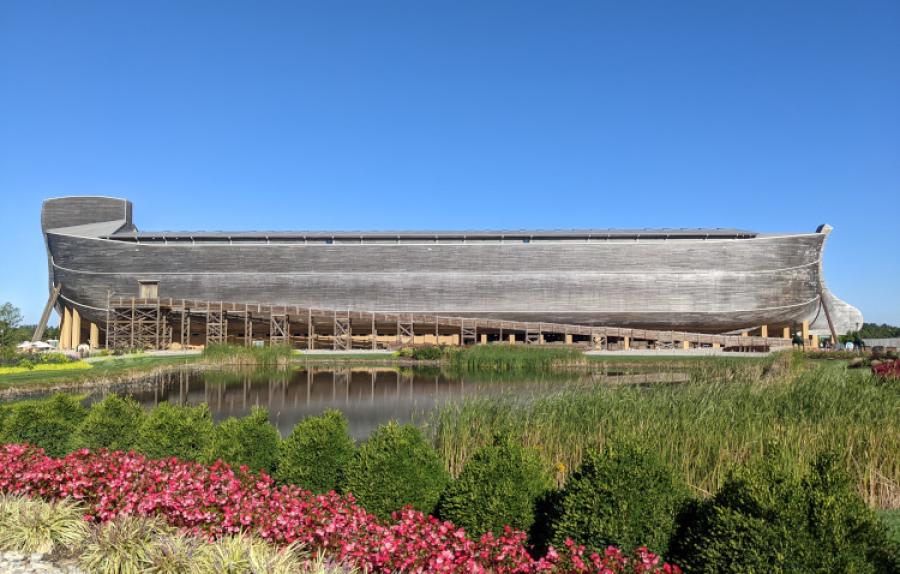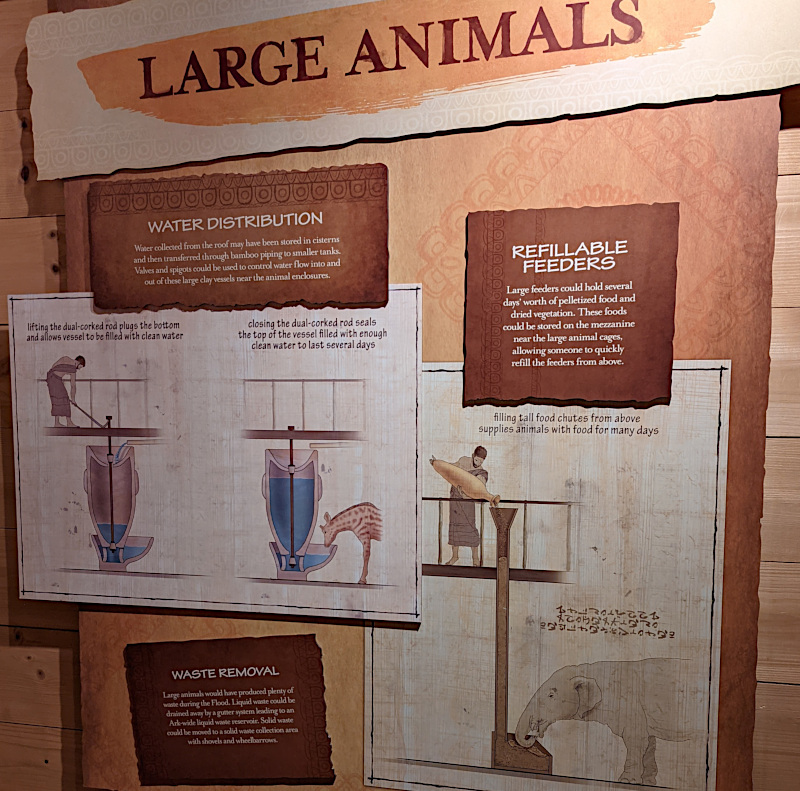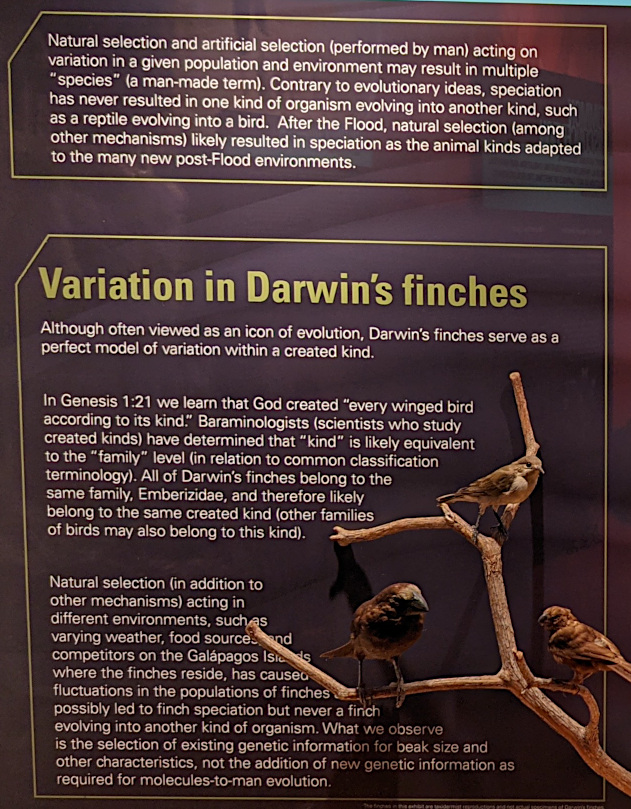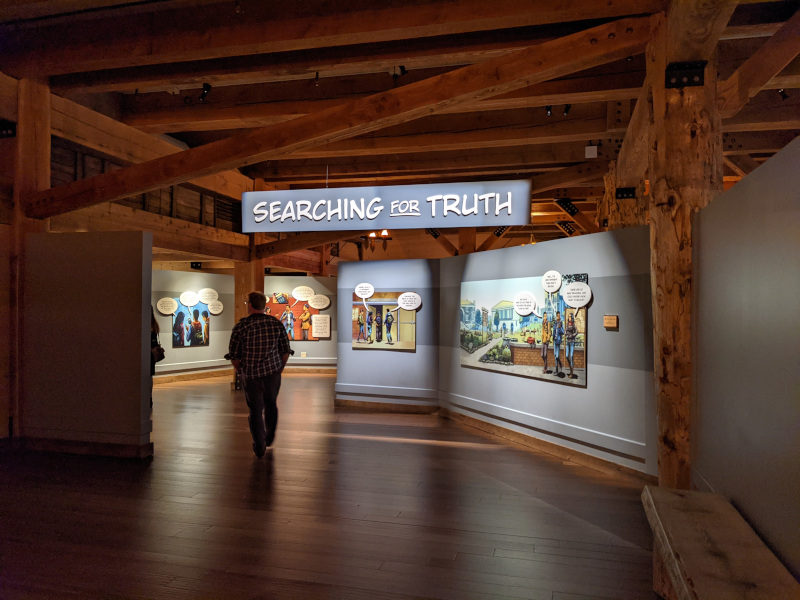Thoughts from My Visit to AiG’s Ark Encounter & Creation Museum
Image

Those who have visited Answers in Genesis’ Ark Encounter or Creation Museum will have their own perspective on the experience and its value. I’ve just returned from my own first-time visit to both and have some observations and thoughts for those who haven’t yet made the pilgrimage.
Is it just a big entertainment business making a few people rich?
Revenue is an inherently tempting thing. Just getting a paycheck every couple of weeks brings hazards as well as blessings. One of the hazards is that as revenue increases, my life and work might become increasingly about revenue.
We’d be fools to think that Ken Ham and Answers in Genesis are invulnerable to that temptation. There are also signs that could be viewed as evidence that AiG is on that road.
- It’s Number 1: The Ark Encounter and Creation Museum have made Northern Kentucky the biggest faith-based tourist destination in America.
- Answers In Genesis to Launch Answers.tv Streaming Platform
- The Latest Biblical Attraction: The Tower of Babel: Answers in Genesis plans a three-year expansion at its Ark Encounter site in Kentucky.
The growth above is in addition to AiG’s already-expansive ventures into Sunday School, VBS, and homeschool curriculum.
Because of how evangelical ministry tends to drift, I had concerns about this before I went to Ark Encounter (Ark) and the Creation Museum (CM). Being there didn’t erase those concerns. I hope and pray that AiG won’t be sucked into the “more and more, and bigger and bigger, is better” trap that afflicts so many megachurches and other large ministries.
That said, I don’t believe that right now, AiG is just an evangelical entertainment biz, pandering to the lowest common denominator of evangelical thrill seekers and belief-validation seekers.
Some reasons why:
- If you’re going to do infotainment at all, you should do it right.
- Doing it right is expensive.
- AiG is shooting for top notch quality, and usually achieving it.
Pretty much everything at Ark is top-notch and nearly everything at CM is also (Exception: The planetarium show on aliens is much in need of an update. The show on the scale of the universe more than makes up for it, though!).
Both sites—which are a good 40 minutes apart by freeway—are kept in excellent condition and surrounded by extremely beautiful gardens. Both are full of exhibits that are as good as any I’ve seen anywhere. I’m not a museum buff, but Ark & CM rival the best museums I’ve toured in visual appeal, clarity, variety and thoughtfulness of the exhibits.
I imagine it would be hard for passionate non-believers to get past that and appreciate the quality of the exhibits, but it’s probably not hard for Christians with different views on the events of Genesis to appreciate.
Are these sites effective apologetics or just preaching to the choir?
Multiple aspects of both Ark and CM surprised me—a few examples:
- Though it has “theme park” like stuff on site (zip line, camel rides for kids, a VR show of some sort, etc.), the Ark itself is pretty much a museum housed inside an exhibit … a cool idea by any standard.
- The love of Christ and the gospel pops up all over in all sorts of ways, both subtle and intentionally non-subtle. In places, the gospel is portrayed with extraordinary beauty and grace. I teared up a bit more than once.
- The level of detail! Multiple times during our day there, my critical thinking circuits would go, “Hmmm, but what about this…?” only to later find that very question directly addressed. The evidence and reasoning in the answers is selective—it has to be—but AiG seems to have thought of all the questions.
- With a few givens in place (e.g., “kinds,” no hibernation, cubit size), I found the project persuasive as a demonstration of one way Noah’s ark could have done the job literally as described in Genesis.
- Tone: The tone is mostly educational, not polemical. I also saw less inappropriate dogmatism than I expected.
But are these sites effective apologetics? Several points on that.
- Ark is definitely more infotainment-oriented than CM.
- Both are clearly aimed at general audiences, not intellectual elites, though CM is a bit more toward that end of the scale.
- Both are clearly aimed at declaring the whole gospel story and educating Christians about Genesis—not mainly equipping believers for debates with skeptics or winning over critics on intellectual grounds.
- Ark is not presented as a “you can believe Genesis now that you’ve seen it” thing. It’s more of a “you can understand Genesis better now that you’ve seen it” thing.
If you go to learn, you won’t be disappointed. If you go hoping to use something there to win your agnostic or atheist friend to Christ—there’s good stuff for that also, but probably not in the “conversion by winning the debate” vein.
Could it be better in some ways?
You can always find ways to make something better.
Infotainment. The blending of “theme-parkiness” with “museuminess” involves some trade-offs. If you dial down the entertainment aspect, you reach fewer people, including some who would be drawn into more thoughtful engagement with the ideas. But the entertainment aspect feeds the skepticism of those who are approaching the big questions more intellectually and suspect the projects are just fun and games and money. I’d like to see CM become even less theme-parky, though it’s already noticeably less so than Ark.
Counterarguments. At multiple points in both Ark and CM, but especially CM, I was aware that there are alternate views and counterarguments against what AiG was presenting. I couldn’t recall what they were and thought the exhibits might be enhanced by acknowledging these more and maybe pointing inquirers to where they can dig deeper into those debates. For example, CM is emphatic that earth must be 6,000 years old because the genealogy in Genesis notes the ages of individuals when they died—so there can’t be gaps. The exhibit leaves it at that.
You can only say so much in exhibit format—and many of CM’s exhibits are already a lot of reading. So I sympathize. Still, maybe there’s a way to use tech to allow guests to tap a Dig Deeper icon and find out why, for example, some still see maybe tens of thousands of years in Genesis but still consider themselves young earth creationists.
Assumptions. Ark is extremely well imagined, and I use “imagined” intentionally. It’s full of detailed explanations of how waste disposal, food distribution, ventilation, water, and more may have been engineered to allow eight people to care for around 800 animals each. Some brilliant engineers had to work through all of that—which means Noah, his family, and whatever other resources he could access, would also have to have done a lot of brilliant engineering.
I don’t find that difficult to believe. There was plenty of time to design and test systems, find failure points, and design new ones, etc. Also, though “Noah built the ark,” we don’t have to believe he never hired anybody for design, materials, and labor.
But a huge portion of the project is built on the assumption that God didn’t simply put all the animals into hibernation. I’m aware of the counterargument that Genesis doesn’t mention hibernation, so we’re filling in gaps from our own thinking on that. But if you visit the Ark you can hardly help but realize Genesis also doesn’t mention intricate waste disposal, food distribution and water management systems! Any view that takes the flood and ark account as historical/factual has two choices:
- Leave the details to God: “It’s not important to me how God made it all work.”
- Imagine a great deal to theorize how it all could have been done.
A portion of a small animals exhibit from Ark…

A portion of a large animals exhibit at Ark …
 Is it less biblical and theologically sound, or more presumptuous, to imagine hibernating animals, a smaller cubit, and a smaller ark that isn’t so thoroughly engineered? (AiG’s attitude is that maybe hibernation happened but it wasn’t necessary.)
Is it less biblical and theologically sound, or more presumptuous, to imagine hibernating animals, a smaller cubit, and a smaller ark that isn’t so thoroughly engineered? (AiG’s attitude is that maybe hibernation happened but it wasn’t necessary.)
One other fact that hit me during these visits is that the AiG concept of “kinds” (Gen. 6:20, 7:14) means they do believe in the evolution of species. They would strongly prefer not to say it that way, because they define “evolution” as the complete naturalistic, molecules-to-man package. But in AiG’s view, a “kind” is a broader category than a species, and we have far more species today than Noah had “kinds” in his day. That would mean that after the flood, specimens of each kind evolved into the many species we have today—by natural selection (see photo of CM exhibit).

Given the relationship of kinds to species and the role of natural selection, maybe we need to stop being so broadly negative about “biological evolution,” and learn more nuanced ways of communicating the differences and similarities between creationist and naturalist views of life on earth.
Should you go?
You don’t have to be convinced that AiG has all the details right to benefit from the Ark Encounter and the Creation Museum. At the very least, these projects are thought-provoking, interesting, and well integrated with the theology of God’s grand plan of creation, fall, redemption, and restoration (CM uses the “Seven C’s” of Creation, Corruption, Catastrophe, Confusion, Christ, Cross, Consummation).
Believers don’t need to see a full scale ark model to be firm in their faith in God and His Word. Ark and CM are not about that. They’re about learning and deepening understanding as well as viewing the world in a more God- and gospel-centered way.
I think you should go. Should you bring your agnostic or atheist friend? That depends on a lot of factors, but it could certainly be a route to some thoughtful conversations about the big questions of what life is, why we’re here, what’s gone wrong, and what it all means.
A small animal storage area from Ark …
The graphic novel style gospel exhibit at Ark …

(Photo credits: Me and my Pixel 5.)
Aaron Blumer 2016 Bio
Aaron Blumer is a Michigan native and graduate of Bob Jones University and Central Baptist Theological Seminary (Plymouth, MN). He and his family live in small-town western Wisconsin, not far from where he pastored for thirteen years. In his full time job, he is content manager for a law-enforcement digital library service. (Views expressed are the author's own and not his employer's, church's, etc.)
- 206 views
A poll on this very website at present has 20 responses, 8 being old earth of some type. Interesting huh…
Why not accept that God created a mature universe?
I am saying IF you accept that (a mature creation) you cannot do things like measure the age of the universe!!!!!!!! As you yourself say stars etc were created mature. Age is meaningless!
If there is a mature creation, then either light was created in transit or some way of “speeding up time” happened. Either way, there is no way to measure distances in either case because the light observed did not traverse the full distance using a speed we can measure. It not a bad thing mind you. It merely means you give up being able to measure distance. You cannot talk about things that rely on processes to be measured to understand them because the processes are not natural, they are miracled.
That is what I am saying.
Your rock analogy is perfect brother!
Let’s say I watch a guy stack 1 rock a minute for 5 minutes. So 5 rocks. I then leave and come back after a total of one hour. I expect 60 rocks but find, say, 900. What happened? I have no idea! I cannot measure it. The process changed midstream….
If you accept a mature creation, would you agree that:
1- The “apparent age” of the universe is not relevant. All that matters is time since creation.
2- The way stars shine is irrelevant because they were all created shining.
3- There are no knew stars being formed. They were only made on day 4.
4- Distance is irrelevant because God made everything in its place, we see it as a testimony to His creation for His glory alone, not as a vast array of objects glowing by physical processes, but are instead miracles.
*I think those are all fair claims of a YEC model. Then why care about astronomy? The entire purpose of the science of astronomy is defeated by every claim of YEC.
How can anyone not believe in a mature creation. Did God make Adam and Eve as babies to grow up, or as mature adults? Can you name anything in the Bible account of creation that was not created fully mature?
I would respond that Mark’s question # 1 is essentially correct. What can we know about time prior to creation? I’m not quite sure what he’s getting at in question # 2, but if the stars were created with emanated light in place, as would appear to be the case, it is not possible to determine their age by measuring their light. (To posit otherwise means that no stars could be viewed from earth until years after creation was complete. This assumption requires a starless sky for a long time.)
As to question # 3, I can’t rule out new stars being formed, any more than I can rule out new mountains being formed by volcanic activity, new islands being formed, etc. Not sure why distance is irrelevant according to # 4, but I do realize that distance measurements requiring presumptions of vast ages cannot be validated. This requires circular reasoning. The non-existence of created emanated light is assumed in order to measure how long it takes for light from a particular star to reach the earth, and then the age of that star is utilized to prove the “fact” of vast ages. If the light was created with the star from the beginning, there is no way to prove the age of the star. (But distance is a separate issue from age, and the speed of light can still be used to calculate distance.)
G. N. Barkman
I am saying IF you accept that (a mature creation) you cannot do things like measure the age of the universe!!!!!!!!
Yeah I except that. It seems like a no brainer, not something that deserves exclamation marks
I think it’s obvious that no one can measure the age of the universe. We we can calculate the age of the universe, based on measurements and assumptions that we can make.
The rock analogy: the problem with the analogy is that uniformity is not in it. It involves a man. And men have limited life spans as well as changing their minds about how much to work, etc.
If we say that an extremely durable robot is adding one rock per minute. And the pile has 180 rocks. The rock building process calculates to have started 3 hours ago, assuming a bunch of things, including no other builder has been involved.
I don’t think it necessarily follows that if one accepts the idea that God created a mature universe, you can’t do science on the “age” of the universe. One reason has already been bandied about in this thread: time is relative. (Saw an article recently reporting that physicists had for the first time, measured gravitic distortion of time across a distance as tiny as a millimeter…https://www.sciencealert.com/physicists-set-a-record-in-measuring-the-d…). So, I still don’t really see why time, from a certain point of view can “really” be a gazillion years and form another point of view also “really” be a few minutes, under the right conditions. So it’s, again, a question of process.
There is some process language in Genesis 1, but we don’t know if God “exploded” the universe into something close to its present form, rapidly moving through all the cause and effect sequences that would, from a different frame of reference, take billions of years, or if He created each astronomical object individually and all the radiation in between them all at once. One could argue that both of these are processes, just very different ones. In any case, you can solve a lot of ‘old universe’ science on age of the universe linguistically just by, in your head, appending the phrase “as we now calculate time from our location in the present universe” to every reference to ‘years.’ Science has to make some assumptions. I don’t think we should shy away from studying the phenomena we observe on the grounds that it was created mature. We should study it, acknowledging our limitations—one huge one being that we don’t really know how time was working when the universe came into being vs. how it works now where we live.
Making and acknowledging assumptions about the unknowns (and unknowables) is something scientists do all the time in studies. Popularizers tend to leave that part out a lot though!
Where I think old earthers have a really big problem is in how they deal with the historicity of Adam. Though C.S. Lewis managed to take an unorthodox view of Adam and Eve (see God in the Dock for example) and not see any coherence problem with the Christian faith, I think he was on thin ice. I can’t remember if he eventually landed on a real human individual man and woman or not. Maybe he did. But I think Christian theology depends on them being a real pair of humans and the first of them.
Views expressed are always my own and not my employer's, my church's, my family's, my neighbors', or my pets'. The house plants have authorized me to speak for them, however, and they always agree with me.
[Dan Miller]I am saying IF you accept that (a mature creation) you cannot do things like measure the age of the universe!!!!!!!!
Yeah I except that. It seems like a no brainer, not something that deserves exclamation marks
The exclamation marks come from 2 pages of posts from people INSISTING that we can measure age and have a young universe.
[Aaron Blumer]I don’t think it necessarily follows that if one accepts the idea that God created a mature universe, you can’t do science on the “age” of the universe. One reason has already been bandied about in this thread: time is relative. (Saw an article recently reporting that physicists had for the first time, measured gravitic distortion of time across a distance as tiny as a millimeter…https://www.sciencealert.com/physicists-set-a-record-in-measuring-the-di…). So, I still don’t really see why time, from a certain point of view can “really” be a gazillion years and form another point of view also “really” be a few minutes, under the right conditions. So it’s, again, a question of process.
There is some process language in Genesis 1, but we don’t know if God “exploded” the universe into something close to its present form, rapidly moving through all the cause and effect sequences that would, from a different frame of reference, take billions of years, or if He created each astronomical object individually and all the radiation in between them all at once. One could argue that both of these are processes, just very different ones. In any case, you can solve a lot of ‘old universe’ science on age of the universe linguistically just by, in your head, appending the phrase “as we now calculate time from our location in the present universe” to every reference to ‘years.’ Science has to make some assumptions. I don’t think we should shy away from studying the phenomena we observe on the grounds that it was created mature. We should study it, acknowledging our limitations—one huge one being that we don’t really know how time was working when the universe came into being vs. how it works now where we live.
Making and acknowledging assumptions about the unknowns (and unknowables) is something scientists do all the time in studies. Popularizers tend to leave that part out a lot though!
Where I think old earthers have a really big problem is in how they deal with the historicity of Adam. Though C.S. Lewis managed to take an unorthodox view of Adam and Eve (see God in the Dock for example) and not see any coherence problem with the Christian faith, I think he was on thin ice. I can’t remember if he eventually landed on a real human individual man and woman or not. Maybe he did. But I think Christian theology depends on them being a real pair of humans and the first of them.
Relativity doesn’t work as a “magic pill” to explain a young universe in the YEC model… Relativity, either general or special, is about reference frames. Special Relativity works like this, I’m either at rest or I am moving. If I am at rest, I see the other thing moving towards me and the distance is shortened. If I am moving the other guy sees the time changed. Time and distance are linked and related and affect each other through velocity. The paper you refer to is General Relativity, with gravity warping space. That is totally predictable through General Relativity. Either way, neither SR nor GR can explain a young Earth in an old universe, or any other combination. One reason is the universe appears old AND the Earth itself appears old! Relativity can’t fix that…
I just want to be clear one more time. The problem I am pointing out is, science and the natural world it models, takes time to work. Light travels from source to destination at a speed. Sound the same. Energy is produced and needs time to transfer from one place to another. Time is intimately involved in how the universe works.
In astronomy, we can observe and measure that a star gets its energy by nuclear fusion. But while the process of nuclear fusion only takes a fraction of a second, the transfer of energy from the core where the fusion occurs to the surface where light shines takes a long time, tens of thousands of years at a minimum, and hundreds of thousands to millions of years in practicality. Stars themselves operate on millions of years time scale. That is a fact based off how they work. This is not a guess, or some unbelieving scientist’s godless opinion. It is a fact. There are hundreds or even thousands of other things like this in the universe. We see them operating on long time scales and can explain them that way…
So, if the universe is instead very young, all that reasonable explanation goes out the window! The science that explained them is then untenable and in fact pointless.
Worse still, if stars are young, and God miracled the light, the nuclear fusion is NOT how the star gets its energy. It gets it from a miracle, because nuclear fusion (as in how a star uses it to distribute energy through the star) does not work on a 6,000 year time scale. It is meaningless to say a star gets its energy from fusion in a YEC model.
Another problem is, these sciences are NOT pointless and untenable. They work!
Thus the dilemma for YEC believers.
My son showed me a video the other day. I was skeptical, and the presenter is certainly not including all the counterarguments, but to his credit he included and answered several. He’s a physicist—not a Christian one—and the central thesis of his video is that we don’t really know the round-trip speed of light because frame of reference leaves us unable to detect it. We assume that a photon we fire at a distant mirror travels toward the mirror at 186k mi/sec toward the mirror and the same speed coming back to us.
Here’s the vid https://www.youtube.com/watch?v=pTn6Ewhb27k
I’m not saying the speed of light is not constant in all directions. But this guy’s doubt has a fascinating implication: for all we know, the light coming to us from stars and galaxies is instantaneous.
I don’t think it’s likely that light behaves that way. But we can’t yet prove it doesn’t, apparently.
Relevance? Well, all I’m saying about “age” of the universe is that we don’t know the “age” of anything except from a particular frame of reference. All talk about ‘age’ really means “age of X as we calculate time here and now in relation to X, with a bunch of assumptions in place.”
It’s really always like that, whether we’re talking about distant galaxies or the neighbor’s dog.
Views expressed are always my own and not my employer's, my church's, my family's, my neighbors', or my pets'. The house plants have authorized me to speak for them, however, and they always agree with me.
does not mean what you think it means. This DOES NOT MEAN that light is not traveling at an average of 300,000 km/s. It is. We send radio signals out at c. We communicate with Mars’ probes. We communicate with New Horizons space crafts out past Pluto. We communicate with Voyager 1 and 2… guess what. The time to communicate with them is the t = d/c formula… this is not a “get out of the problem with ambiguity” card for the YEC model.
A lot of time has passed in the universe, and the inability to measure the one-way speed of light is a definitional issue, not a real one.
One way we know the one-way speed of light is not “crazy” is the uniformity of the CMB. If the one-way speed of light were infinite one way, and c/2 the other, you would see all kinds of astrophysical artifacts in the universe. We don’t see them, so the one-way speed of light is not an issue.
[Aaron Blumer]Here’s the vid https://www.youtube.com/watch?v=pTn6Ewhb27k
Not sure why but on my computer, using 3 different browsers, this youtube page opens with comments, etc. but there is no video…
[Mark_Smith]Not sure why but on my computer, using 3 different browsers, this youtube page opens with comments, etc. but there is no video…
Reboot & clear cookies
[Craig Toliver]Reboot & clear cookies
I’m on a diet. I don’t deal with cookies anymore… :-)








Discussion